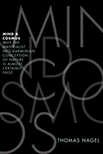
Mind and Cosmos
by Thomas Nagel, Oxford University Press, © 2012,
130 pages, $24.95 (hardcover), ISBN-13: 978-0-19-991975-8

The subtitle of this book is “Why the Materialist Neo-Darwinian Conception of Nature Is Almost Certainly False.” Nagel is not a religious writer using a religious viewpoint. He is a university professor in the Department of Philosophy and the School of Law at New York University. His book accepts the evolution of biological systems, but he argues philosophically that the standard model of evolutionary biology is fundamentally incomplete.
The book is divided into six chapters which involve philosophical problems with anti-reductionism, consciousness, cognition, and value. Nagel attacks scientific naturalism which he says is based on “speculative Darwinism explanations of practically everything, and armed to the teeth against attacks from religion.” He says that there has been a triumph of ideological theory over common sense.
This is an academic attack on the weaknesses of evolutionists like Richard Dawkins in his attempts to explain the human eye. Nagel points out that defenders of intelligent design like Behe, Meyer, and Berlinski have raised valid points and that “they do not deserve the scorn with which they are commonly met. It is manifestly unfair.” The chief value of the book is that it reduces the validity of the attacks that have been made on the suggestions that design in the cosmos speaks of a designer. Nagel discusses the issue of cognition. One of his main thrusts is how consciousness fits into Darwinian theory. He also examines how value fits into consciousness in Darwinism. These are not arguments from physical or biological science, but logical and philosophical problems that Neo-Darwinists and naturalists have ignored.
We recommend this book to people interested in philosophy. It is beyond the reach of most general readers, but college students and college graduates who have had some background in philosophy will find the book unique, interesting, and compelling.
